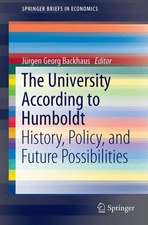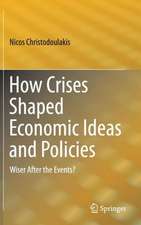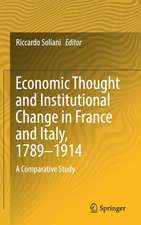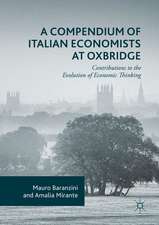Commerce and Strangers in Adam Smith
Autor Shinji Noharaen Limba Engleză Hardback – 4 iun 2018
Firstly, the book describes how Smith was influenced by information from around the world. Leaving eighteenth-century Europe, including Smith’s native Scotland, people travelled, traded, and immigrated to far-flung parts of the globe, sometimes writing books and pamphlets about their travels. Informed by these writers, Smith took into consideration the world beyond Europe and strangers with non-European backgrounds.
Against that background, the book reinterprets Smith’s moral philosophy. In The Theory of Moral Sentiments, Smith developed his moral philosophy, in which he examined how people form opinions through their meetings with strangers. He researched how encounters with strangers created the sharing of social rules. As such, the book studies how Smith believed that people in dissimilar communities come to share common concepts of morality and justice.
Lastly, it provides an innovative reading of Smith’s political economy. In The Wealth of Nations, Smith established the market model of economic society. However, he saw the limitations of that model since it does not consider the impact of money on economy and international trade. He also recognized the limitations of his own equilibrium theory of market, the theory that is still influential today.
| Toate formatele și edițiile | Preț | Express |
|---|---|---|
| Paperback (1) | 626.15 lei 38-44 zile | |
| Springer Nature Singapore – 19 ian 2019 | 626.15 lei 38-44 zile | |
| Hardback (1) | 728.43 lei 3-5 săpt. | |
| Springer Nature Singapore – 4 iun 2018 | 728.43 lei 3-5 săpt. |
Preț: 728.43 lei
Preț vechi: 888.32 lei
-18% Nou
Puncte Express: 1093
Preț estimativ în valută:
139.40€ • 145.00$ • 115.08£
139.40€ • 145.00$ • 115.08£
Carte disponibilă
Livrare economică 25 martie-08 aprilie
Preluare comenzi: 021 569.72.76
Specificații
ISBN-13: 9789811090134
ISBN-10: 9811090130
Pagini: 150
Ilustrații: XI, 192 p. 2 illus.
Dimensiuni: 155 x 235 x 17 mm
Greutate: 0.47 kg
Ediția:1st ed. 2018
Editura: Springer Nature Singapore
Colecția Springer
Locul publicării:Singapore, Singapore
ISBN-10: 9811090130
Pagini: 150
Ilustrații: XI, 192 p. 2 illus.
Dimensiuni: 155 x 235 x 17 mm
Greutate: 0.47 kg
Ediția:1st ed. 2018
Editura: Springer Nature Singapore
Colecția Springer
Locul publicării:Singapore, Singapore
Cuprins
Introduction.- Travel literature and the Enlightenment world.- Fellows an strangers in The Theory of Moral Sentiments.- Adam Smith on the cyclicity of the rise and fall of civilization
.- Smith on money and the impact of encountering strangers on Europe.- Adam Smith on markets.- Encountering the world in The Wealth of Nations.- Conclusion.
Recenzii
“The book is ambitious in that it touches a lot of bases. There are discussions of social and political background, well-informed and evaluative literature surveys, and references to contemporary debates on issues such as globalization and communitarianism. … the book provides an instructive perspective within its defined agenda.” (Christopher J. Berry, Eighteenth-Century Scotland, Vol. 33, 2019)
Textul de pe ultima copertă
This book offers unique insights into how Adam Smith understood globalization, and examines how he incorporated his knowledge of the world and globalization into his classical political economy. Although Smith lived in society that was far from globalized, he experienced the beginning of globalization. Smith considered the most developed society the commercial society: the society that results from people meeting with strangers. Among Enlightenment thinkers, Smith was one of the most important figures with respect to interaction in the world, and it is through his lens that the authors view the impact of the mixing of diverse peoples.
Firstly, the book describes how Smith was influenced by information from around the world. Leaving eighteenth-century Europe, including Smith’s native Scotland, people travelled, traded, and immigrated to far-flung parts of the globe, sometimes writing books and pamphlets about their travels. Informed by these writers, Smithtook into consideration the world beyond Europe and strangers with non-European backgrounds.
Against that background, the book reinterprets Smith’s moral philosophy. In The Theory of Moral Sentiments, Smith developed his moral philosophy, in which he examined how people form opinions through their meetings with strangers. He researched how encounters with strangers created the sharing of social rules. As such, the book studies how Smith believed that people in dissimilar communities come to share common concepts of morality and justice.
Lastly, it provides an innovative reading of Smith’s political economy. In The Wealth of Nations, Smith established the market model of economic society. However, he saw the limitations of that model since it does not consider the impact of money on economy and international trade. He also recognized the limitations of his own equilibrium theory of market, the theory that is still influentialtoday.
Firstly, the book describes how Smith was influenced by information from around the world. Leaving eighteenth-century Europe, including Smith’s native Scotland, people travelled, traded, and immigrated to far-flung parts of the globe, sometimes writing books and pamphlets about their travels. Informed by these writers, Smithtook into consideration the world beyond Europe and strangers with non-European backgrounds.
Against that background, the book reinterprets Smith’s moral philosophy. In The Theory of Moral Sentiments, Smith developed his moral philosophy, in which he examined how people form opinions through their meetings with strangers. He researched how encounters with strangers created the sharing of social rules. As such, the book studies how Smith believed that people in dissimilar communities come to share common concepts of morality and justice.
Lastly, it provides an innovative reading of Smith’s political economy. In The Wealth of Nations, Smith established the market model of economic society. However, he saw the limitations of that model since it does not consider the impact of money on economy and international trade. He also recognized the limitations of his own equilibrium theory of market, the theory that is still influentialtoday.
Caracteristici
Considers the impact of the global interaction of people through the lens of Adam Smith, the founder of political economy Discusses how people with varied backgrounds and values can share rules of morality without social division and conflict Examines how Adam Smith incorporated his knowledge of the world and globalization into his classical political economy










